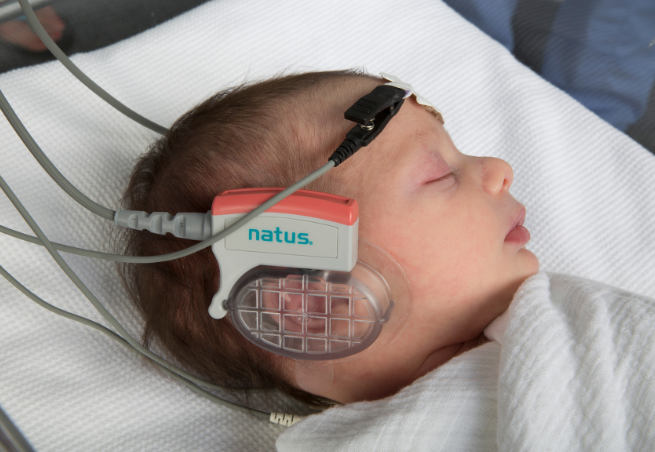Nearly two out of every 1,000 babies screened have some type of hearing loss, according to the Centers for Disease Control and Prevention (CDC). It’s important to reduce the amount of noise babies are exposed to in infancy, particularly in the neonatal intensive care unit (NICU), and ensure that all are screened for hearing loss since early intervention is key.
Hospitals can be loud. What do neonatologists do to protect babies' ears in the NICU?
Quieter environments can improve infants’ sleep and lead to better weight gain in the NICU. Noise in the NICU can come from ventilators, continuous positive airway pressure (CPAP) machines, heating or cooling systems, alarms on medical equipment and normal conversations among staff and parents. This cumulative noise can negatively affect newborn ears. Unfortunately, incubators are not soundproof.
Research conducted by Pediatrix® Medical Group clinicians Christine Aune, M.D., a neonatologist, and Amber Coston, P.A., a physician assistant, found that noise levels in NICUs are often louder than guidelines determined by the American Academy of Pediatrics (AAP). According to these guidelines, hospitalized infants should not be exposed to noise levels that exceed 45 decibels, yet they often exceed 55 decibels both inside and outside the incubator.
“Small, premature babies stay inside double-walled plastic incubators for a significant amount of time during their stays in the NICU,” explained Kaashif Ahmad, M.D., of Pediatrix Neonatology of Houston, who serves as the clinical medical director for the NICU at the Woman’s Hospital of Texas. “The newborn intensive care unit can create excessive noise, which can potentially be harmful to the development of hearing or lead to hearing loss.”
Adhesive ear coverings called ear muffs can be attached to babies’ ears to muffle the noise, but they often fall off. Even worse, when an ear muff partially detaches, it can cause an unexpected amplification because sound can reverberate between the ear and the surface of the earmuff, according to Dr. Ahmad.
Recently, Dr. Ahmad and several collaborators researched whether a noise-canceling device in a simulated NICU environment can reduce the amount of sound that penetrates an incubator. In collaboration with Invictus Medical in San Antonio, the team used Neoasis™, a non-contact device that broadcasts a canceling sound wave in response to noise. In a simulation using mannequins in the NICU at CHRISTUS Children’s Hospital, the system determined the optimal sound wave needed to reduce sound pressure in the incubator while still allowing the sound of caregiver’s voices to be heard.
“Essentially, the device creates a zone of cancellation where the baby’s head is located inside the incubator,” said Dr. Ahmad, who also serves as research director for neonatal clinical trials for Pediatrix. “Noxious noise is either eliminated or very significantly reduced. We found that the noise-canceling device was superior to over-ear coverings, like ear muffs.”
How are babies tested for hearing loss in the NICU?
Pediatrix clinicians follow the guidelines of the AAP’s Early Hearing Detection and Intervention program. Our clinicians strive to screen every newborn for hearing loss in the first month of life. If a child fails the screen, they will be referred for a diagnostic hearing test with an audiologist before they reach three months of age. If the diagnostic test shows sensorineural hearing loss, the child should have intervention by six months.
In the NICU, hearing loss is evaluated using a non-automated auditory brainstem response (ABR) test. Hearing screen results are ear-specific, so neonatologists will know if just one ear is affected or both. The test can reveal if a response is present, delayed, absent or inconclusive.
“However, a baby in the NICU may still be too small to have a hearing screen done,” explained Dr. Ahmad. “So we’ll screen them once we know an infant is well enough to go home, and that’s usually our first clue that a baby may have trouble hearing.”
What happens if the baby doesn’t pass the hearing screening?
Often, additional testing is needed.
“By definition, the inpatient newborn hearing screen is just a screen and not the definitive gold standard for diagnosing a hearing issue,” said Dr. Ahmad. “Generally, if a baby doesn’t pass the hearing screen the first time, we’ll perform another one before they go home. If they don’t pass the second screening test, we’ll work with the baby’s parents to arrange for outpatient follow-up either with an audiologist or otolaryngologist, also called an ear, nose and throat (ENT) specialist, for more sophisticated and detailed testing that can’t just be done at the bedside.”
Can there be a false positive?
Yes. Sometimes a second or third test will be negative for hearing loss, but it’s important to catch a hearing issue early.
“We don’t want to miss detecting a disease or an illness affecting a baby’s ability to hear, but sometimes there can be a false positive,” Dr. Ahmad explained. “We want to ensure we don’t miss anyone because if an issue is overlooked during infancy, it may not be detected for a year or two later when it becomes clear that they’re having hearing trouble. If diagnosis is delayed, we’ve missed a critical window for intervention.”
What should I do if I suspect my baby has trouble hearing?
Let your baby’s care team know if you notice any issues with your baby.
“Even in the NICU, nobody knows your baby better than you do,” Dr. Ahmad said. “Parents are around their babies more than any individual nurse, more than any individual physician. If you have concerns about your baby, hearing or otherwise, be sure to tell your baby’s doctor. And, if you have concerns about the noise level on the unit, let the care team know so they can take steps to reduce the amount of noise.”
